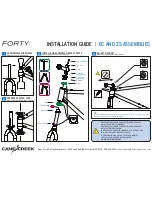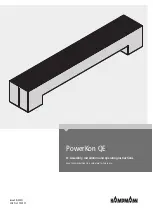
15
CChhoooossiinngg aa PPoorrtt
D
DO
OM
MEE PPO
ORRTT 66””
#5503 ........Wide angle 28mm to 17mm
or lens up to 7.6cm (3") in length
#5503.20 ..Nikon 18 & 20mmD lenses
#5503.50 ..Lens 7.6-10.1cm (3-4")
#5503.55....Lens 8.9-11.4cm (3.5-4.5")
#5503.80 ..Lens 10.1-12.7cm (4-5")
#5503.81....Nikkor 28-105mm lens only
#5503.85 ..Lens 12.7-15.2cm (5-6")
SUPERWIDE DOME PORT 6”
#5503.15 ........Lens up to 6.3cm (2.5")
D
DO
OM
MEE PPO
ORRTT 88””
#5510.80 ..8” Dome Port (see lens & port recommendations)
Some zoom lenses may require the addition of a +4 diopter close-up lens.
(Available from camera store).
•With the lens on the camera extended to
full length, measure from front of camera
to face of lens.
•Select the appropriate port based on the
lens type and length.
•Maximum lens diameter accommodated is
8.4cm (3.3")
•Maximum lens diameter when using
zoom or focus clamp 7.6cm (3.0”)
Measure
PPoorrtt IInnffoorrm
maattiioonn
While we have included a list of our ports and a short list of
Lenses and port recommendations we suggest visiting our web site
for the latest information on lenses and port recommendations.
16
PPoorrttss CCoonnttiinnuueedd
FLAT PORT
For standard, macro, and telephoto lenses.
Due to refraction flat ports reduce the angle-of -coverage of a lens
and at the same time enlarge the image. This makes the flat port
ideal when using standard, macro or zoom lenses to shoot small
subjects. Note that if a port is long enough to accommodate the
full length of a 1:1 macro lens, the lens may vignette when used at
infinity. If access to the lens' full range is desired, then select a
dome port instead.
FLAT PORT
#5501 . . . . . Lens up to 6.3cm (2.5")
#5502 . . . . . Lens 6.3-8.9cm (2.5-3.5")
#5502.41 . . Lens 7.9-10.4cm (3.1-4.125")
#5505 . . . . . Lens 8.9-11.4cm (3.5-4.5")
#5505.45 . . Lens 10.4-13cm (4.1-5.125")
#5505.5 . . . Lens 11.4-14cm (4.5-5.5")
#5505.58 . . Lens 13-15.5cm (5.1-6.125")
FLAT PORT WITH FOCUS
For long lenses whose focus collar extends beyond the housing
focus. Telephoto lenses longer than 135mm are not recommended.
#5506. . . Lens 8.9-11.4cm (3.5-4.5")
#5506.5 . Lens 11.4-14cm (4.5-5.5")
5507 . . . . Lens 14-16.5cm (5.5-6.5")
5508 . . . . Lens 16.5-19cm (6.5-7.5")
5508.05 . Nikor 105mm lens only
13
U
Ussiinngg EExxtteerrnnaall SSttrroobbeess CCoonntt..
U
Ussiinngg IIkkeelliittee N
Noonn--D
DSS SSuubbssttrroobbeess ((SSuubbssttrroobbee 5500,, 110000AA,,
220000,, 440000)) w
wiitthh tthhiiss H
Hoouussiinngg..
The Conversion Circuitry is automatically disabled when used
with a Non-DS Substrobe. These Substrobes can be used in their
manual mode utilizing any power settings provided on the
Substrobe.
U
Ussiinngg N
Noonn IIkkeelliittee SSttrroobbeess w
wiitthh tthhiiss H
Hoouussiinngg..
The Conversion Circuitry is automatically disabled when used
with a Non Ikelite Strobe. Non Ikelite strobes can be used in their
manual mode utilizing any power settings provided on the strobe.
SSttrroobbee AArrm
mss
This housing offers two types of arm mounting systems. The
top of the rubber handles utilize Ikelite’s Quick-Release Arm,
available with the SA-100R Arm system.
The bottom of the rubber handles have a wing nut that accepts
the Ikelite Tray Mount. The Tray Mount comes with the Ikelite
SA-125 Arm system and the SA-100T Arm system.
LLuubbrriiccaannttss
1. Ikelite provides silicone lubricant with the housing. We
recommend that you use only Ikelite lubricant as some other
brands may cause the o’ring to swell and not seal properly.
2. Use only enough lubricant to lightly cover control shafts and
o’rings. Wipe off any excess lubricant with a clean cloth.
Lubricant is not a sealant, it is used to reduce friction. Excessive
lubricant can collect sand and dirt which may interfere with
proper sealing.
CCAAU
UTTIIO
ON
N
N
Neevveerr uussee sspprraayy lluubbrriiccaannttss aass tthhee pprrooppeellllaanntt iinnggrreeddiieenntt ccaann
ccaauussee tthhee ppllaassttiicc hhoouussiinngg ttoo ccrraacckk..
14
PPrree--D
Diivvee YYoouurr SSyysstteem
m
It is recommended that you take the complete system into a
swimming pool before use in open water. This will give you a
chance to become familiar with the handling and operation of
your housing and strobe(s).
O
Oppttiioonnaall AAcccceessssoorriieess
LLeeaadd W
Weeiigghhtt ##00990066..5588
The buoyancy of the system will depend on the size and
number of strobes used as well as the weight of the camera.
Ideally the system should be slightly negative in the
environment in which it will be used. If you need to add weight
to the system, an optional lead weight is available. To add the
lead weight remove the (2) screws from the bottom of the
aluminum tray. Place the lead weight into the pocket of the
aluminum tray and reattach.
IIkkeelliittee LLuubbee ##00118844..11
PPoorrtt O
O’’rriinngg ##00110055
H
Hoouussiinngg BBaacckk O
O’’rriinngg ##00113322..5599
While both the Port and Back o’rings should last quite some time
it is best to carry a spare in case one becomes damaged or lost.
SSttoorriinngg tthhee H
Hoouussiinngg
When the housing is going to be stored for a prolonged period
the exterior of the housing should be soaked in a mild soap
solution, rinsed and dried thoroughly. Then remove the back and
port from the housing. Remove the back and port o’rings, lightly
lubricate them and place them in a plastic zip-lock bag. Place the
plastic bag inside the housing for storage.
























